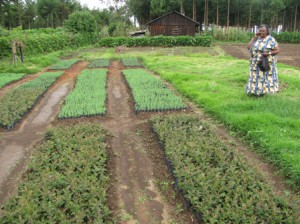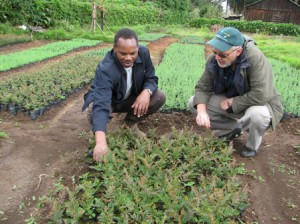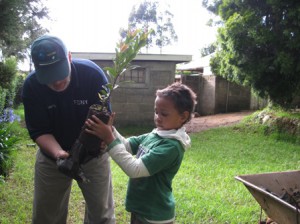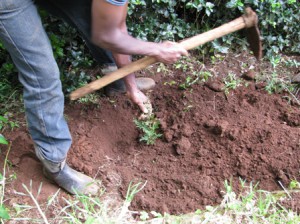I promised to reveal a silver lining to the black cloud of my mother-in-law’s forced felling of part of the eucalypt plantation she’s been tending and coppicing forever, her main source of firewood, so here goes. The sight of the newly bare patch of land made her start looking around for a source of seedlings for replanting, and a coincidental visit by some old friends of mine got her thinking that maybe she should go indigenous. At least partly, anyway. Eucalypts are too fast-growing to give up altogether. Her visitors were Lex Thomson and Randy Thaman, who I worked with in the Pacific, and were in Kenya for the International Agroforestry Congress. They noticed a few Prunus africana trees around her place, and told her about its potential. Lex has since left a comment about this on an earlier blog post of mine.
Anyway, after some searching around, Hilda (for that is her name) came across Mr Douglas Ndirangu Kirichu’s nursery at a place called Lari Forest Station in Uplands Division, a short drive along a passable dirt road from her farm. Mr Kirichu runs the Kimotu Environmental Group. He has about a hundred people who collect seeds from the surrounding forest, which he then raises to seedlings and sells, for KSh 30 each (that’s about USD 0.50). Apparently there’s a law that a community can only graze their animals in the forest if they also have a nursery raising indigenous tree seedlings for replanting. So that’s what Mr Kirichu’s group does. To the tune of about 30,000 seedlings when we visited him. 1

In addition to Prunus africana (mueri in Kikuyu), Mr Kirichu (that’s him on the left in the picture below) also has muna (Aningeria), mutamayo (Olea), mukoe (Dombeya), pondo and mukima (not sure what these are — maybe someone out there can help me?).

So we bought a couple of each, of course. And Hilda got a dozen mueri to start off her plantation.

And we planted them both up at the farm (thanks, GK!) and down in Nairobi. Maybe that made the holiday carbon neutral?

Dear Luigi,
Pondo is podocarpus & Mukema is grevillea.
Ciao
Julia
Thanks, Julia. Podocarpus makes sense, but that Mukima didn’t look much like Grevillea (although actually the seedlings were very small and I wouldn’t know anyway). Could it possibly be anything else?
Very cool project Luigi. Do you happen to have any idea (given the legal requirement you mentioned) how many/how common such nurseries are in the region?
i’m grateful to read your article. am a lover of nature since my childhood and am persuing a nature science degree in kenya. i need to know more about you and even to work with you if posible.
my name is james mwasaha nguma, am fron nairobi am the chairmain of vison development self help group. i have been traying to translate the following indiginous tree names from kikuyu to english and sientific but all in vain will ytou assest please/
mukoigo,muringa.muhu. miteredu, mufaritio. i will be glard if you will do that we have tree nusary in our area.
just confirming what Julia said Mukima is actually grevillea.
What do you call Muthaite in English?
Asante
Is it camphor?
Mùthaitì
What do we call murereshwa in English?
When I worked there long ago there was an extensive card index of local names matched to identified herbarium specimens in the old “East African Herbarium” – probably now part of the museum in Nairobi. This is the best way to make sure that the local name (or names) is consistent.
what is quinoa in kikuyu or kiswahili
well done document.
Thanks for a great article and insight. Small q: what is mutuiya in english?
Great article and very informative discussion! I am looking for jacaranda seedlings. Can anyone point me to the right direction on where I can get these? Thanks and Merry Christmas and Happy New Year!!
mukima, muvuru, muthaite, muthithinda all those can you translate them for me in english please?
Mukima-Grevillea robusta
Muthaite-Ocotea usambarensis
Muthirinda-Cypressus lusitanica may other Cypressus spp
Muvuru-Vitex doniana
Thanks, Alice.
What is muringa/moringa tree in english?
Moringa is one of the English names. Drumstick Tree is another. But to be honest, the Latin name — Moringa oleifera — is the most useful name as it is one that all people can agree on.
Great piece. Ol Pejeta Conservancy in Laikipia is working with farmers and has established tree nurseries, now looking at 100k seedlings by March. Had rough time getting the names right! – but ended up with the names here – hope got it right
Caesalpinia Mubage
Melia Mukowe
Cordia holstii Muringa
Teclea Munderendu
calodendrum Muraracia
Markhamia Muu
Dombeya Mukoe
Brownii Mukubu
Erythrina Muhuti
Dalbergia melanoxylon mukoma
Acacia xanthophloea Murera
Acacia melanoxylon Kanunga
Croton macrostycus mutundu
Croton megalocarpus Mukinduri
Olea Mucharage
Polysciais kikuyensis Mutati
Thanks!
Thanks for this information, and very best of luck in your efforts.
THE CORRECT KIKUYU NAME FOR PRUNUS AFRICANA IS: MUIIRI
Thanx for reminding me some of the trees and their scientific names.
Hey, could you help me with names of those trees (they are all used for building dhows in Kenya):
muangati, nguvi, kelekele, nimhtree, mugambo, bambaro
Thanks!
You may find most of the indigenous tree species in this databases. Please check if helpful:
Agroforestree database
Useful trees and Shrubs for Kenya
I have seedling e.g Muu,muthithida e.t.c .assist to get customers, plus fruits seedlings too ……….0715200333
Deje Landscapes is a company deals with landscaping services and tree Nurseries.
We have over 65 types of indigenous and exotic trees.
Apart from tree seedlings,we also have succulents, types of grass, flowers, herbs and spices, water plants, ground covers, fruits, ornamental and ceremonial trees.
Please keep in touch for inquiries and delivery in this no. 0714093538.
We are located in Nanyuki, Cottage Hospital road.
Thanks
How can I contact kimotus environmental group am in need of muna tree